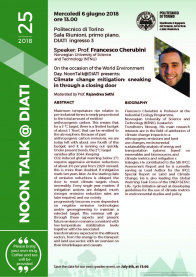25 - Nook Talk@DIATI
Mercoledì 6 giugno 2018 - dalle ore 13:00 alle 14:00 - Politecnico di Torino, Sala Riunioni - 1° piano, DIATI ingresso 3
CLIMATE CHANGE MITIGATION: sneaking into a closing door
Speaker Prof. Francesco Cherubini, Norwegian University of Science and Technology (NTNU)
Prof. Rajandrea Sethi moderates the discussion
ABSTRACT - Maximum temperature rise relative to pre-industrial times is nearly proportional to the total amount of emitted anthropogenic carbon. This means that for a 2 °C target, there is a limited budget of about 1 TtonC that can be emitted to the atmosphere. Because of past anthropogenic carbon emissions, we are today left with about one fourth of this budget, and it is running out quickly. Under present trends, the 2°C target vanishes after 2044. Keeping CO2-induced global warming below 2°C requires aggressive emission reductions of about 3% per year from 2020 onward; this is more than doubled if mitigation starts ten years later. As the starting date of emission reductions is delayed, the door to meet climate targets closes irreversibly. Every single year matters: if mitigation actions are delayed, much stronger emission reduction rates are later required, and our society progressively becomes more dependent on negative emission technologies and/or geoengineering to maintain a selected target. This seminar will go through these aspects and present future emission scenarios consistent with low-temperature stabilization levels together with the associated transformations expected in the different sectors, from the energy to the transport and land use sector, with an overview on their interlinkages and caveats.
SHORT BIO - Francesco Cherubini is Professor at the Industrial Ecology Programme, Norwegian University of Science and Technology (NTNU), located in Trondheim, Norway. His main research interests are in the field of attribution of climate change impacts to anthropogenic emissions and land use changes, environmental sustainability analysis of energy and transportation systems based on renewables and bioresources, and climate metrics and mitigation strategies. He contributed to the 5th IPCC Assessment Report and he is currently serving as Lead Author for the IPCC Special Report on Land and Climate Change. He is also leading the Global Warming Task Force of the UNEP-SETAC Life- Cycle Initiative aimed at developing guidelines for the use of climate metrics in environmental studies and policy.

